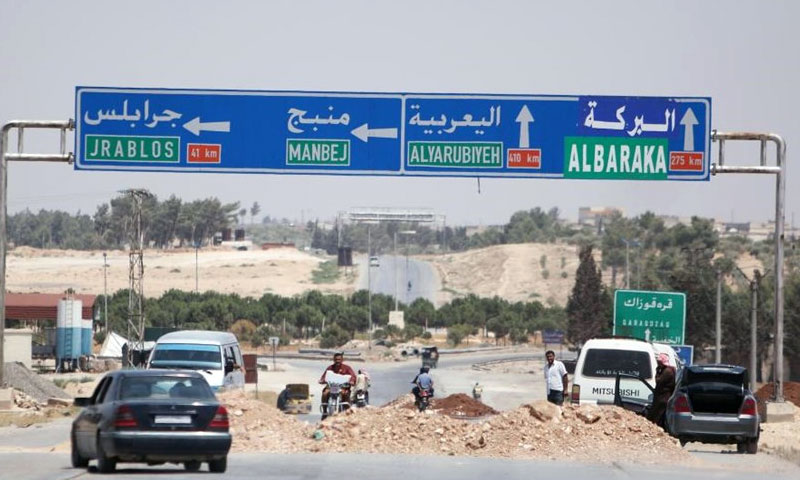



That who travels taking the roads between Aleppo and Idlib must notice the presence of independent workers, belonging to none of the two areas’ councils nor to private companies, at the two sides of the road, along with manual equipment used for the repair of potholes in roads.
In the majority of the Syrian areas, roads are suffering various problems, especially that repair and maintains operations have been absent for years now; random potholes are proliferating, resulting from the war circumstances, continuance shelling and the movement of heavy vehicles (military and civil), which affected these roads’ quality and performance, enhancing the difficulty of travel and transportation.
These workers, whose age range varies between ten to 40 years, are in search for a means to make a living. They repair potholes in return for the money that drivers bestow them along the road, said Abdullah (42 years old), a driver of a minibus, who transports people between the two cites of Azaz and Manbij, rural Aleppo.
Abdullah explained that the phenomenon proliferated in the past a few years and that people are resorting to this profession, if it could be called a so, to make a daily living in exchange for alleviating the suffering of the drivers, who spend a lengthy time on roads that might be mistaken for being made of dirt with the disappearance of wide patches of asphalt and the spread of potholes.
The huge unemployment ratio in the area forces some citizens to transfer this profession into a form of beggary, since workers pursue the passing drivers to get money. However, the workers refuse the label, including Omar (19 years old), who believes that he is offering the drivers a service, in return for which he deserves a payment, objecting to specifying a fixed wage or even asking all drivers to pay the same amount.
“Each driver gives us a sum of money that he finds suitable, but the majority pays between 100 to 200 Syrian pounds. Jobs are scarce in the area and the expenditures are large; we want to do anything that help us make a living”, he said to Enab Baladi.
Most of the workers are based in areas near the roads where they perform, facing cruel conditions marked with insufficient fiscal resources. These people’s main concern is to make a living and support their families.
At the same time, they stress the importance of their job, according to Omar, who pointed out that the holes in the roads usually render the cars out of service, damaging certain parts. Repairing the potholes helps the drivers overcome the risks of their cars being malfunctioned and lessens the damage percentage which the destroyed roads might inflict on their vehicles.
Enab Baladi interviewed a few passengers to see what opinion they have about the mission conducted by these workers; they described it as useful, among them is Mohammad Atallah (45 years old), calling the Manbij-Azaz road a “hell” due to its tattered infrastructure and need for intensive restoration.
Atallah said that these workers are fixing the roads with what resources and ability they have; accordingly, they are alleviating the people’s suffering. What they are doing is a public service since they chose to act when the concerned authority is missing, especially that it is supposed to be the party responsible for roads’ safety and restoration, as well as providing job opportunities, pointing out that “these young people could have turned into bandits, but they took on the work, regardless of how simple it is; the society’s duty is, thus, to encourage and support them”.
While these workers are neither supported nor protected, Atallah believes that their offered services could by more effective if they were given the right tools or organized in a modest manner, which would develop their work, preserve some of their rights and protect them from harm and offense.
The deteriorating quality of the roads has also negatively affected passengers, as it elongated the travel period, since travelling between the two cities of Azaz and Manbij used to require less than two hours; today, however, it needs more than three hours and a half.
if you think the article contain wrong information or you have additional details Send Correction